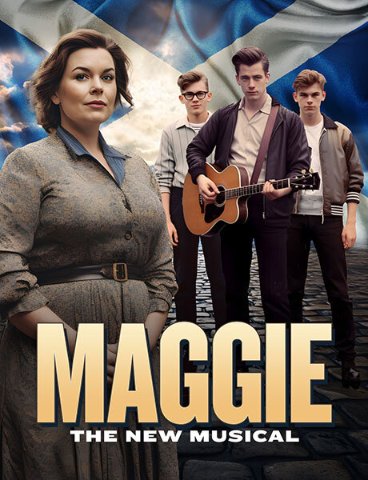Maggie at Goodspeed
New Musical Launches Fall Season
By: Karen Isaacs - Sep 16, 2024
Goodspeed, for the second year, is presenting a new musical in its early fall season. Each has been unconventional, but one that showcases community and love.
Maggie is a heartfelt musical that should appeal to a wide range of audiences. It is the antithesis in many ways of what some would expect of a Goodspeed musical – there is not a tap dance or big dance number in sight. It runs through Sunday, Oct. 20.
What is there is a terrific cast telling a modern story with music that fits the eras.
As I was watching it, I saw references to Billy Elliott, Once, and even Come from Away, not just in story but also in musical styles.
Singer/songwriter (and music producer) Johnny Reid bases Maggie on his grandmother’s story. He wrote the music (with Matt Murray and Bob Foster) and the book and lyrics with Matt Murray.
The title character, beautifully played by Christine Dwyer, lives in a close-knit Scottish town whose coal mines dominate the economy. With two sons and a third on the way, her husband dies in a mine accident. She raises her three sons through Scotland’s turbulent years of the ‘60s and ‘70s.
One can point to the stereotypes – the plucky, determined mother willing to scrub floors to provide for her children and encourage them to pursue their dreams, and the angry men feeling displaced as their livelihoods disappear and societal norms are turned on their heads.
Despite this – or perhaps because of it – we can see the connections to today’s society. The men are confronted with the closing of mines, the rising independence and options for the women who had been content with being housewives and mothers, as well as the political push for a more inclusive society.
While I was aware of some of the changes Scotland had experienced during those 25+ years, particularly the closing of the mines and then, in the 1970s, the discovery of the North Sea oil, I was unaware of two other significant factors. One was the mass immigration to Canada, Australia and the US during that period, caused by the lack of economic opportunity. The second was Protestant-Catholic hostilities. We tend to think of these as being confined mainly to Northern Ireland and “the troubles,” but apparently, they were also prevalent in Scotland, though not to the same extent.
Though the show begins in 1954, it quickly jumps to 1968, when the three boys (Shug – the eldest, Tommy – the middle son, and wee Jimmy, the youngest) are teenagers. Each has dreams – Shug to become a musician, Tommy a footballer, and Jimmy, an engineer. But hurdles face each of them. Shug puts aside his dream and goes into the mines, falling under the influence of Tam, whose anti-Catholic prejudice riles the men to violence. The result is that Tommy also loses his dream. Only Jimmy manages to pursue his successfully.
The prejudices show in other ways – we learn that Maggie was disowned by her Catholic family when she married Jimmy, and Teresa (wee Jimmy’s fiancée) creates discord among the brothers because she is Catholic.
At times, the relationships among the brothers, the neighbors, and even the story of Uncle Charles seem to detract from Maggie’s story. She becomes simply the hard-working, sacrificing mother, filled with doubts. I’d like more.
Beowulf Boritt, the Tony award-winning scenic designer, has created a stone wall backdrop that reminds us of the industrial town; it easily transforms into various locations – the streets, the pub, a church, and Maggie’s house. He and director Mary Francis Moore create a Catholic church with just two props – banks of votive candles – and lighting by Japhy Weideman. His effective lighting design for the show creates the appropriate mood. Costume designer Emily Rebholz and music director Jay Hilton, do fine work.
I was glad that dialect coach Jennifer Scapetis-Tycer aimed to suggest the Scottish accent without stressing authenticity; I have always found that accent to be particularly difficult to understand.
The show opens with the town’s women waiting for the men to come from the mines and head to the pub, but not before handing over their paychecks. It allows us to meet Maggie’s three friends – Betty, Jean, and Sadie. But the stunning moment in that first scene is the love song “Unbreakable” that Jimmy sings to Maggie.
Dwyer gives Maggie a strong presence, conveying her determination and self-sacrifice. This is a woman with whom you can identify. Her songs “Used to be Fire” and “What You’re Looking For,” as well as the reprise of “Unbreakable,” are terrific.
The three sons – Tommy (Wes Williams), Shug (Jeffrey Kinger), and wee Jimmy (Sam Primack) — create a realistic depiction of sibling alliances and competition.
Ryan Duncan offers an amusing but real portrayal of Uncle Charles – Maggie’s gay brother-in-law. His support for her and her sons reinforces the idea that “it takes a village.”
Matt Faucher is as close to a villain as this piece has. He portrays the angry Tam, who dominates (and abuses) his wife and riles up the miners against the Catholics.
Thankfully, the creators have not made Maggie a happily-ever-after show. That would have been fake. Instead, they have a more realistic ending – not everything is as we would like it to be, but the family and the community are still intact.
Tickets are available at Goodspeed.org.
This content courtesy of Shore Publications and Zip06.com

